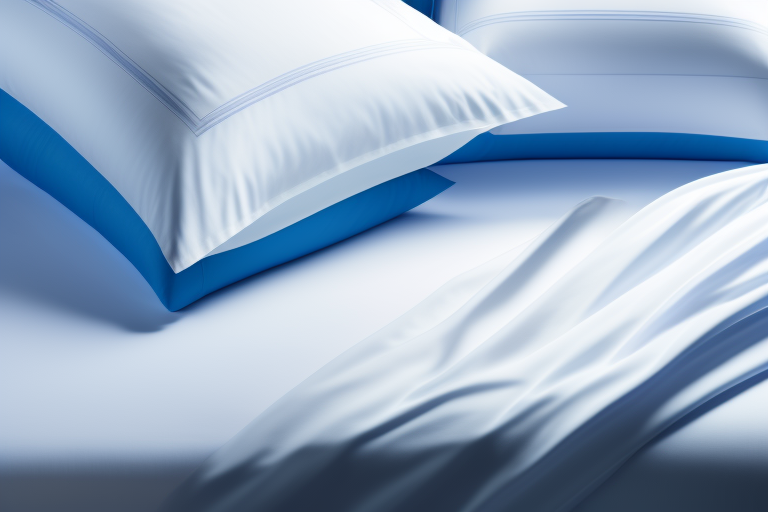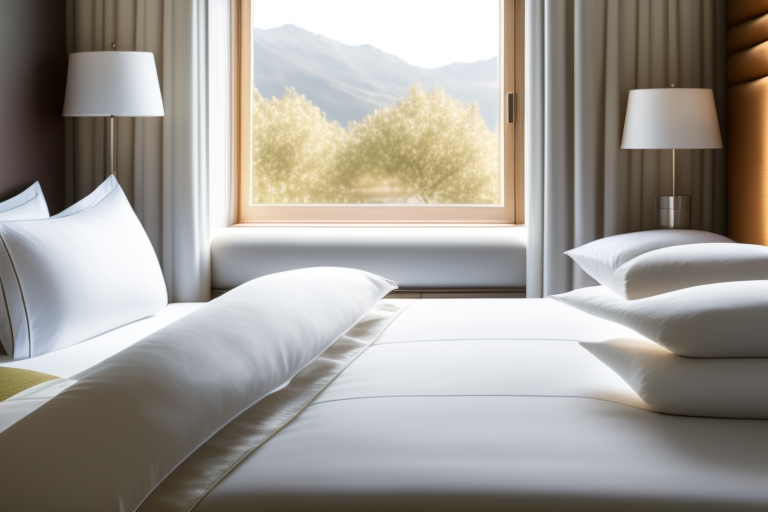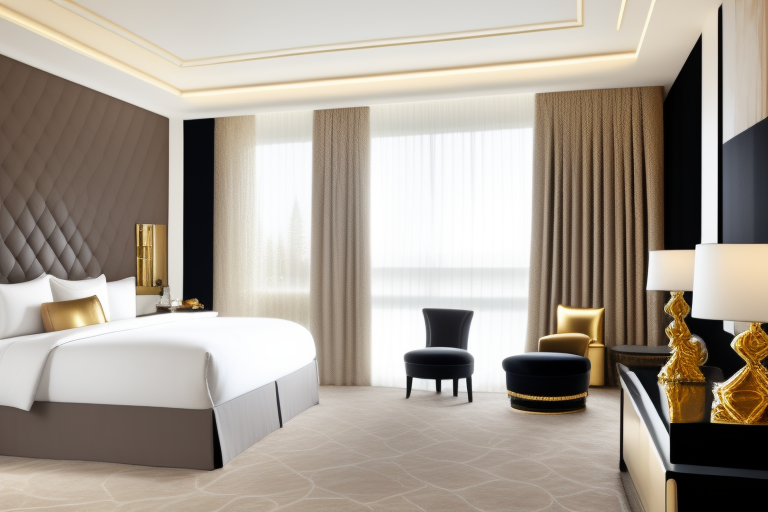Whether you’re traveling for business or pleasure, nothing beats settling in for the night at a hotel and crawling into a clean, comfortable bed outfitted with high-quality linens. But have you ever wondered where hotels buy their notoriously luxurious bedding?
As it turns out, outfitting hotel rooms with the right bedding products involves much more than grabbing the first set of sheets you see at the local home goods store. Hotels invest significant time, money, and effort into selecting bed linens and other bedding items that will provide guests with a superior sleep experience.
In this beginner’s guide, we’ll explore all the ins and outs of hotel bedding and reveal where hotels shop for those delightful duvets and heavenly pillows that make spending the night away from home such a rejuvenating experience.
An Overview of Bedding Essentials for Hotel Rooms
Before we dive into where hotels source their bedding, let’s do a quick rundown of the key bedding components included in a typical hotel room:
Sheets
Sheets are the foundation of a good night’s sleep. Hotel sheets are typically made of premium fabrics like cotton, linen, bamboo, and microfiber. The exact sheet material is chosen based on factors like cost, durability, and desired feel.
Pillows
A quality pillow ensures guest comfort. Hotels select pillows in different fills, including down, down alternative, memory foam, and poly-fill. The number of pillows per bed ranges from 2-6.
Duvets/Comforters
These provide warmth for sleeping. Materials like down, down alternative, wool, cotton, and synthetics are common. Hotels favor duvets with machine-washable covers.
Blankets
Extra blankets allow guests to customize warmth. Hotels stock blankets in cotton, wool, synthetic blends, and sometimes specialty materials like cashmere.
Mattress Pads
Placed over the mattress for protection, these pads also boost comfort. Materials like feather, foam, wool, and cotton are typical.
Bedspreads
The decorative bedspread provides an extra layer of aesthetics. Hotels often opt for bedspreads that complement the overall room decor.
Pillow/Mattress Protectors
Waterproof protectors safeguard pillows and mattresses from perspiration, makeup, and other damage. Vinyl and polyurethane protectors are popular hotel choices.

Key Factors Hotels Consider When Buying Bedding
When equipping a property with bed linens and other bedding accessories, hotel purchasing managers and hospitality buyers don’t just select the first products they see. They carefully evaluate items based on a range of important criteria.
Comfort
Comfort is paramount—a luxurious night’s sleep encourages guests to return. Hotels test bedding for softness, breathability, and temperature regulation.
Durability
With frequent laundering, hotel bedding must resist pilling, fading, and tearing even after repeated wash and dry cycles. Longevity saves hotels money.
Cost
Hospitality buyers compare bedding costs across brands. More budget-friendly hotels may opt for economy lines from suppliers. Luxury hotels splurge on high thread count sheets and premium materials.
Style
Bedding must coordinate with the hotel’s design sensibilities and aesthetics. Trendy hotels may select modern colors and prints while boutique hotels favor neutral palettes.
Sustainability
To attract eco-conscious travelers, many hotels now incorporate bedding made from organic cotton, bamboo, recycled materials, and other sustainable textiles.
Other Factors
Easy-care, wrinkle-resistant bedding simplifies housekeeping. Hypoallergenic bedding suits guests with allergies. Branded bedding boosts perceived value.
Where Do Hotels Buy Their Bedding?
Hospitality buyers have several options when it comes to selecting and purchasing bed linens and other bedding products for their hotels.
Hospitality Bedding Companies
Many bedding manufacturers cater specifically to the hospitality industry. These companies sell everything from sheets to duvets to pillow protectors in bulk quantities at wholesale prices.
Bedding Brands & Suppliers
Hotels may work directly with brands like Serta and Sleep Number that sell both direct to consumers and to commercial clients. Some hotels create custom bedding lines exclusive to their properties.
Specialized Hotel Distributors
Distributors like Gold Key Supply and Curtis Hospitality Supply specialize in hotel furniture, amenities, linens and more. Their wide selection provides one-stop shopping.
Big Box Retailers
For economy bedding, hotels may shop at big box stores like Bed Bath & Beyond, Target and Walmart. High-end hotels are less likely to buy from these mass retailers.
Online Retailers
The convenience of web-based shopping allows procurement managers to easily compare bedding options across brands and suppliers. Online retailers often extend bulk/wholesale pricing.
Notable Hospitality Bedding Brands
Experts at sourcing bedding for hotels, the following brands provide the linens, duvets, pillows and other bedding that give hotel guests sweet dreams:
Downlite Bedding
With over 55 years in the hospitality industry, Downlite supplies down and down alternative bedding like duvets. Known for luxury comfort and quality.
Standard Textile
This company delivers bedding, including sheets, pillows and mattress pads, to over 17,000 hotels worldwide. Focused on innovation and technology.
WestPoint Hospitality
A supplier of bedding essentials for leading hotel chains. Known for expertise in manufacturing and logistics.
Thomaston Mills
Leading provider of hotel towels and bed linens. Known for soft, durable fabrics and unique designs.
Venus Group
Venus supplies everything from bedding to bathroom accessories to over 125,000 properties. Known for combining quality with affordability.
Current Trends in Hospitality Bedding
Just like in the consumer marketplace, certain trends are shaping the types of bedding popping up in hotel rooms:
Sustainability – To reduce environmental impact, hotels are selecting bed linens made from recycled materials and organic fibers like bamboo and eucalyptus.
High-Tech Fabrics – Breathable, moisture-wicking and temperature-regulating textiles, like Tencel and Botanicore, create cooling, pleasant sleep surfaces.
Customization – Co-branded bedding that matches a hotel’s brand identity helps create a unique guest experience.
Luxury – High thread count sheets (400-500 TC), heavyweight comforters, and down inserts signal indulgence.
White Aesthetic – Crisp white bedding keeps rooms feeling fresh and clean.
Branded Partnerships– West Elm, Leesa, and other known brands design exclusive bedding lines for hotels seeking reputable names that resonate with guests.

Outfitting Hotel Rooms Goes Beyond Bedding Basics
Of course, bedding isn’t the only supply that hotels need to stock guest rooms. Hospitality buyers also source:
Towels – Absorbent bath, hand and face towels made from cotton, bamboo and microfiber.
Bathrobes & Slippers – Plush robes and slippers provide added luxury.
Amenities – Shampoos, conditioners, and body lotions must coordinate with brand identity.
Cleaning Supplies – Environmentally-friendly cleaners approved for use on bedding and bath textiles.
Furniture – Beds, nightstands, work desks, lounge chairs, etc. must balance functionality and aesthetics.
Decor – Artwork, mirrors, throw pillows and accent pieces complete the room design.
Flooring – Durable carpet or vinyl flooring can withstand heavy foot traffic.
Window Treatments – Blackout curtains, sheers and drapes soften the room and control light.
Bath Fixtures – Showers, tubs, sinks, toilets and hardware coordinate with design motifs.
Bed Toppers – Extra mattress pads, foam toppers and featherbeds supplement existing bedding for premium sleep.
Climate Control – HVAC systems, fans, thermostats and more maintain ideal temperature and airflow.
Safety Equipment – Smoke detectors, security systems and in-room safes protect guests.
Electronics – Televisions, clocks, phones, internet routers and other gadgets provide entertainment and convenience.
Lighting – General overhead lighting, task lighting, accent lighting and blackout curtains control brightness.
Staff Uniforms – Staff clothing should align with brand image and allow for easy movement.
Clearly, the list of supplies required to outfit hotel rooms is lengthy! Hospitality buyers have their work cut out for them sourcing all these items from various vendors and manufacturers.
Key Takeaways About Hotel Bedding and Supplies
- A quality sleep experience is critical for hotels to satisfy guests, earn loyalty, and drive revenue.
- Bedding is a significant investment that factors into a hotel’s operating budget. Durability and maintenance costs are key considerations for purchasing.
- Many hospitality-specific companies sell wholesale bed linens, duvets, pillows and other bedding to hotels. Brands like Downlite and Standard Textile are top suppliers.
- Hotels shop for bedding and other room supplies based on criteria like cost, comfort, and design coordination. Eco-friendly and high-tech materials are on the rise.
- Outfitting a hotel goes far beyond bedding to include amenities, decor, electronics, climate control systems, safety equipment, staff uniforms and more.
- Hospitality buyers have their work cut out for them managing the many vendor relationships and operational details that bring the guest room experience to life!
So the next time you rest your head on a sumptuous pillow at a hotel, know that a lot of work went into curating that little slice of sleeping heaven! The hospitality industry puts great care and expertise into selecting just the right bedding to help travelers sleep soundly.
Frequently Asked Questions
What types of sheets do hotels use?
Hotels tend to use sheets made of premium materials like Egyptian or Pima cotton, linen, bamboo, and microfiber with a high thread count between 250-500. Percale, sateen, and jersey knits are common hotel sheet types. The best hotel sheets offer durability, breathability, softness, and easy maintenance.
Where do hotels buy their pillows in bulk?
Hotels source pillows in bulk quantities from hospitality bedding suppliers like Downlite and Standard Textile. Many hotel pillows feature a down or down alternative fill for plush comfort. Hotels also stock foam and polyfill pillows. The most important criteria are comfort, support, and durability.
What is the standard hotel bed size?
The most popular hotel bed size is the queen at 60” x 80”, followed by king size beds measuring 76” x 80”. Double or full size beds (54” x 75”) are also used for solo travelers. Large hotels may offer a variety of bed size options to suit guests’ needs.
How often should hotels replace their mattresses?
Industry experts recommend hotels replace mattresses every 9 years. For luxury hotels focusing on indulgence, replacing them every 6-7 years ensures maximum mattress comfort. Regularly rotating mattresses and using mattress protectors extends lifespan.
How can hotels be more eco-friendly in their bedding?
Hotels can choose bed linens made from organic cotton or other natural materials like bamboo, hemp, and eucalyptus. Recycled polyester and sustainably sourced down/feathers are other options. Oeko-Tex certified bedding ensures safer textile production.
What are the latest trends in hospitality bedding?
Top trends include moisture-wicking, cooling fabrics for temperature regulation, white minimalist bedding palettes, custom-designed branded bedding matching hotel aesthetics, indulgent thread counts over 400, and sustainable materials like Tencel and organic cotton.
Where can I buy hotel bedding for home use?
Many hospitality bedding suppliers sell products directly to consumers for home use. Brands like Downlite, Sobel Westex, and Hollander provide the quality bed linens, pillows, featherbeds and mattress toppers hotels rely on.








